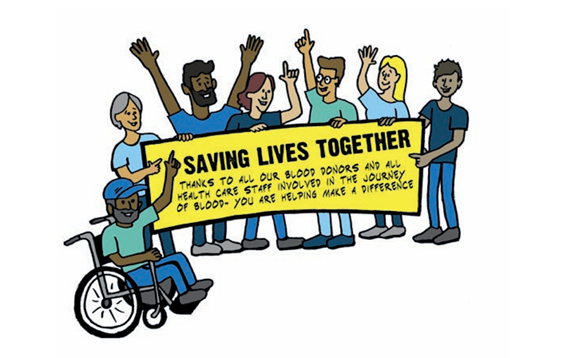Donor Haemovigilance Hub
| Developed in collaboration with |
Explore practical, evidence-based resources to enhance donor care and safety. The donor haemovigilance hub shares powerful learning and real-world insights to support continuous improvement. Protecting blood donors is the foundation of a safe, sustainable and reliable blood supply.
Clinical assessment following donor adverse events (DAEs)
| Jan 2026 | Assessing donors with a possible vasovagal reaction (PDF 224KB) |
| Jan 2026 | Assessing donors with a possible allergic reaction (PDF 233KB) |
| Jun 2025 | Assessing donors with possible arm complications (PDF 288KB) |
Useful additional resources
| Jan 2026 | Good venepuncture practice (PDF 384KB) |
| Dec 2025 | Management of accidental arterial puncture (PDF 357KB) |
| Jun 2025 | Post-donation management of blood donors with nerve injury related to donation (PDF 622KB) |
Useful external sites
| Serious Hazards of Transfusion (SHOT) - Please see donor haemovigilance chapters in the Annual SHOT Reports, related resources including mythbusters |
| Association for the Advancement of Blood & Biotherapies (AABB): Donor Hemovigilance |
| International Society of Blood Transfusion (ISBT): Haemovigilance Tools and resources |
| International Haemovigilance Network |
| NOTIFY library |
About the Donor Haemovigilance Hub
What are these documents about?
These documents provide guidance for the assessment of donor complications associated with blood donation, aiding in possible diagnosis and promoting consistent, standardised reporting of blood donor adverse events. They also support the appropriate management of donors and donations.
Who are these documents intended for?
These documents are intended for healthcare professionals responsible for the clinical assessment of donors experiencing potential adverse events following blood donations. These will not replace the clinical judgement required for the evaluation of donor adverse events.
Acknowledgements
We would like to thank the working group comprising all four UK Blood Services for their contributions to these documents, as well as the nursing staff from each UK Blood Service for their valuable feedback. We also extend our gratitude to the JPAC (SACCSD) and SHOT offices for their support.
Copyright permission
These documents are the properties of JPAC (SACCSD) and SHOT. Credit should be provided if they are used or copied. For wider circulation, formal permission must be obtained from the JPAC or SHOT office.
Enquiries
Please contact the JPAC office at JPACOffice@nhsbt.nhs.uk for any questions related to these documents. When contacting, please specify that your query pertains to documents on clinical assessment following DAEs.
Review Period
The information provided will be reviewed every three years through an internal process.
Donor Haemovigilance Doodles
These doodles are free to download! They can be used for teaching purposes and as email signatures.
Images should be used as they are, without amending, or cropping any of the details or SHOT logo.
Please contact SHOT with any feedback or ideas for future messages at shot@nhsbt.nhs.uk.


